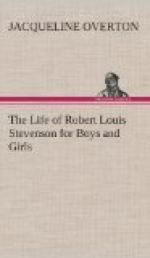Lloyd Osbourne says: “He was consulted on every imaginable subject.... Government chiefs and rebels consulted him with regard to policy; political letters were brought to him to read and criticise.... Parties would come to hear the latest news of the proposed disarming of the country, or to arrange a private audience with one of the officials; and poor war-worn chieftains, whose only anxiety was to join the winning side and who wished to consult with Tusitala as to which that might be. Mr. Stevenson would sigh sometimes as he saw these stately folks crossing the lawn in single file, their attendants following behind with presents and baskets, but he never failed to meet or hear them.”
He aided one party of chieftains in prison, and to show their gratitude on regaining their freedom they cleared and dug a splendid road leading to his house. All the labor and expense they bore themselves, which amounted to no small matter. Ala Loto Alofa, they called it, the Road of the Loving Hearts.
Warlike outbreaks were not infrequent near Vailima. The woods were often full of scouting parties and the roll of drums could be heard. One day as Stevenson and Mrs. Strong were writing together they were interrupted by a war party crossing the lawn. Mrs. Strong asked: “Louis, have we a pistol or gun in the house that will shoot?” and he answered cheerfully without stopping his work: “No, but we have friends on both sides.”
With all their political differences he and the officials retained friendly feeling. He paid calls on them at Apia and attended various town gatherings, while they were often entertained at Vailima.
Always hospitable, it was a delight to him now to keep open house. Not only the chief justice, the consuls, the doctor, the missionaries, and the traders were in the habit of dropping in to Vailima, but from every ship that docked at Apia came some visitor who was anxious to meet Stevenson and his family; from the war-ships came the officers and sailors.
The bluejackets were always particularly welcome. Mrs. Strong tells of a party who came from H.M.S. Wallaroo on one Thanksgiving Day, when “the kitchen department was in great excitement over that foreign bird the turkey” and all was confusion. “But Louis kept his sailors on all the afternoon. He took them over the house and showed them ... the curiosities from the islands, the big picture of Skerryvore lighthouse,... the treasured bit of Gordon’s handwriting from Khartoum, in Arabic letters on a cigarette paper,... and the library, where the Scotchmen gathered about an old edition of Burns, with a portrait. Louis gave a volume of Underwoods (Stevenson’s poems) with an inscription to Grant, the one who hailed from Edinburgh, and the man carried it carefully wrapped in his handkerchief. They went away waving their hats and keeping step.”
A croquet-ground and tennis-court were laid out, and Vailima was the scene of balls, dinners, and parties of all kinds. No birthday or holiday, English, American, or Samoan, was allowed to pass unnoticed, and the natives were included in these festivities whenever possible.




